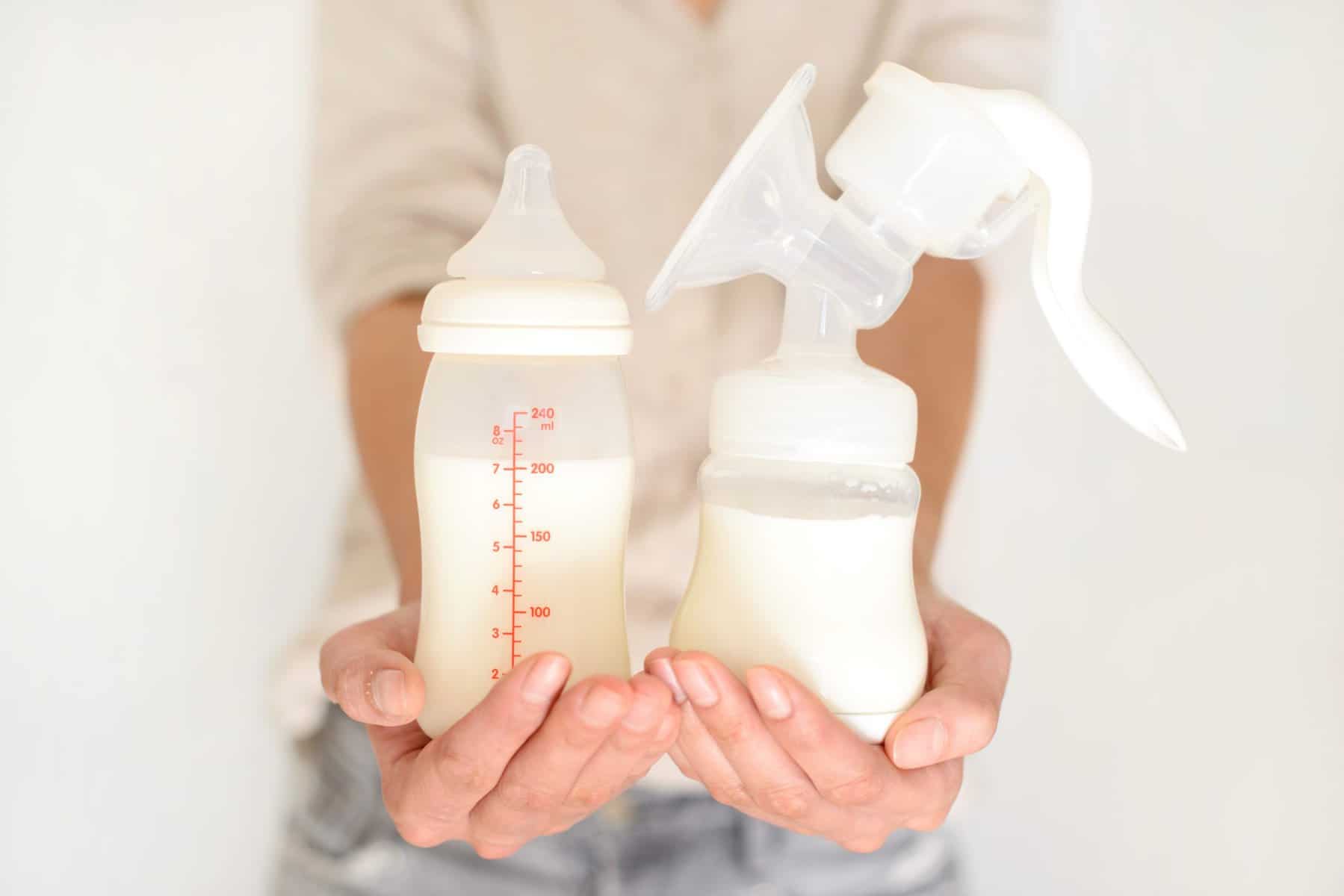There are many concerns around breastfeeding and milk production among new mothers.
Some have trouble with production right off the bat, while others don’t but cannot get their newborn to latch.
If you were successful with both at first, but now you suspect your supply might be decreasing, read about the 4 telltale signs that it’s indeed happening as well as the possible solutions.
Mind you, this is mostly a dilemma for breastfeeding moms. If you use the pump, then it’s easier to be sure whether you’re really producing less milk or not.
The 4 Signs Your Milk Supply Might Be Decreasing

New moms are absolutely watchful of their babies, so these four signs of decreasing supply aren’t easy to miss because you will notice them in your baby’s growth and behavior.
Start suspecting decreased supply in case of:
- poor weight gain
- irritability
- change in digestion
- dehydration
1. The Baby Isn’t Gaining Enough Weight

First and foremost, it’s important to keep in mind that some weight loss is completely normal in the first few days after birth.
Some infants may even lose up to 10% of their birth weight, but in the following days their weight gain should stabilize (100g – 200g per week).
Low milk supply could indeed cause your baby to gain weight slowly.
Make sure to see a pedriatician to discuss if there are any other reasons for this, as well as possible solutions if milk is indeed the issue.
2. The Baby Is Irritable After Feeding

Breastfeeding is incredibly comforting and fulfilling to babies. It’s a sure way for your baby settle down and happily go to sleep.
If you notice that the baby is increasingly irritable after feedings, then you may start suspecting low supply.
It means that the baby didn’t get enough sustenance, they’re still hungry and so they become fussy.
Another way you could notice this change, is that the baby stopped making gulping sounds during feedings – in case they made this sound in the first place.
Some infants don’t make any noise at all.
3. Diaper Change Becomes Less Frequent

In the early days after birth, fewer diaper changes are required. However, after about a week, you may notice about 6-8 diaper changes (sometimes more) in the span of 24 hours.
Watch closely for this number, for any changes in the number of dirty diapers could be indicating something important.
If you indeed notice such a change, speak to your doctor. They will know best, after all.
4. There Are Signs of Dehydration

Babies should not ingest anything other than breastmilk or formula until they’re about six months old. This means that your milk is the food and the water for your baby.
Hence, low supply will not only affect the infant’s weigth gain, but also their levels of hydration.
It’s important to be familiar with the early signs of dehydration, so that you may react as quickly as possible and get your doctor’s advice if necessary.
Among the most common signs of dehydration is a dark yellow urine, and as previously mentioned, a fewer number of dirty diapers within 24 hours.
Another telltale sign is crying without tears and chapped lips. There’s also increased crankiness.
Your doctor will know the best way to provide your baby the necessary hydration if you don’t have enough milk.
What Could Be Causing Lower Milk Supply?

Anything from nutrition to disbalanced hormones could be affecting your ability to breastfeed.
Check out the common causes and if you can’t solve it by yourself quickly, make sure to see your doctor.
Birthcontrol Pills

Contraceptive pills cause noticeable changes in your body even when you’re not going through a sensitive period such as post-partum and breastfeeding.
If you’d like to delay or avoid another pregnancy, there are quite a few safe birthcontrol options that don’t contain estrogen and don’t affect your hormones.
Speak to your doctor if you want additional help in choosing the safest one.
Your Baby Never Latched Properly

This is a common issue for many young mothers. It’s also why a lot of women opt for pumping or using formula.
For some, their baby won’t latch at all. It’s often useful to consult a lactation professional before even giving birth in order to learn how to coach your baby into latching properly.
Try different positions and angels to make it easier for the baby to latch, and once you’re successful, you’ll notice that the milk you have is completely drained – this allows for more production.
You’re Fatigued

This one sounds like a joke, I know. With a newborn on your hands you’re fatigued by default. However, there’s only so much your body can take.
Your partner, parents and other close people who may offer immediate support come in here.
While they take over for a little while, you take a power nap or a shower and make sure to drink enough water.
IGT (Insufficient Glandular Tissue)

IGT is an actual condition, which makes producing breastmilk quite difficult. Glandular tissue makes breastmilk.
Women who have this condition usually don’t experience any change in their breasts, before and after birth.
Still, it’s possible to breastfeed at least in part. You may consult a lactation assistant, and let them help you combine the breastmilk you can naturally produce with formula.
Polyscystic Ovary Syndrome

This is an incredibly common issue for many women (1 in 10). PCOS has various symptoms, and they’re not the same for everyone, though low milk supply is a probable one.
Previous Breast Surgery

If you’ve ever had enhancement, reduction or another type of breast surgery, it could be affecting your ability to produce enough milk.
It’s not a general rule – there are women who experience no change despite having had surgery – but it is something to keep in mind.
So, What Is a Mom to Do?
There are a few things you can try in order to naturally promote production of breastmilk.
Skin-to-Skin Contact With Your Little One

Our bodies are incredibly intuitive. Holding your baby in a way that their skin touches yours may help produce oxytocin and prolactin which are very beneficial for milk production.
It can also positively affect your baby’s immune system.
Pumping Session

If your baby hasn’t letched well, then there’s left-over milk in your breasts. This could possibly stifle the production of new milk.
Introduce a pumping session after breastfeeding to promote the production of breastmilk.
Try Protein, Foods and Drinks That Promote Milk Production

Nurturing our bodies with diverse foods is very important – post-partum or not.
There are foods that help your hair and nails grow, your skin clear out and your bones become stronger.
Likewise, there are supplements, foods and drinks you may introduce into your diet to promote milk production.
Lessen the Use of Pacifier

In order to instigate your breasts to produce more milk, you could try the method known as comfort nursing.
It means that when your baby is being fussy, instead of allowing them to suckle on the pacifier bring them to your chest.
This will promote milk production and also help your baby to get better at latching, thus making nursing easier for the both of you.

